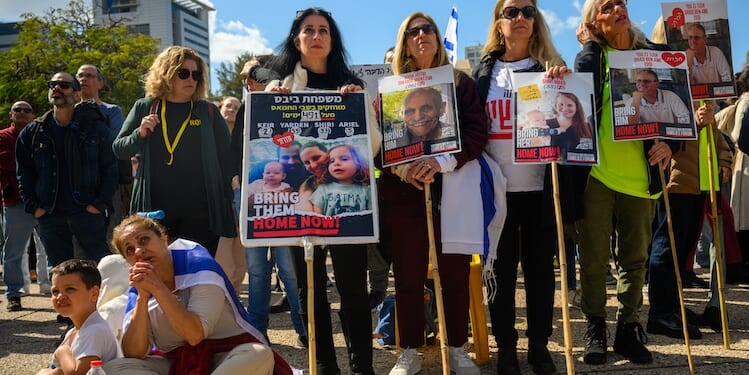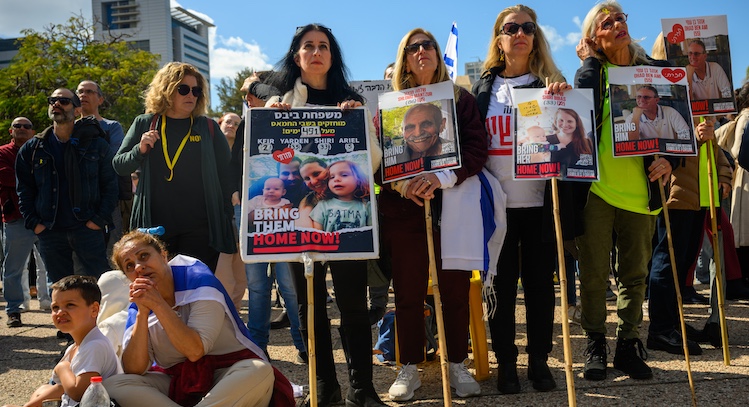The Hebrew word for hostages—hatufim—has become familiar even to many in the English-speaking world since the Hamas attacks of October 7. Yet it’s a reminder of how close this issue is to the hearts of Israelis that the term has trended before.
In late 2019, New York Times TV critic Mike Hale wrote a retrospective of the just-about-to-pass decade in television and streaming. Hale’s article offered his view of the 30 best scripted series produced outside the U.S. during that decade. He made an exception for an Israeli series released in 2009, known on streaming services as Prisoners of War. It soon became clear why Hale was willing to bend the rules for this show: He declared it No. 1.
Prisoners of War was an Israeli series that inspired the U.S. series Homeland. Its original title was Hatufim. Here’s what Hale wrote about it: “The show that inspired ‘Homeland’ turned out to be something quite different: tense but in a quiet, leisurely, realistic style; a taut and intelligent political thriller that was above all a melancholy, at times heartbreaking character study of soldiers and families damaged by war.”
The plot concerned a couple of Israeli hostages who have finally been freed as part of a prisoner swap with Hezbollah in Lebanon after 17 years in captivity. The show was adapted in Russia and India as well as the U.S., but there was one element of the original version that was hard to replicate: In Israel, redeeming hostages is paramount, and thus the captives themselves become household names. When they return home alive, they must transition from being national symbols to flesh-and-blood citizens.
The efforts to bring home captives are part of Israel’s social compact. As I wrote for the March 2024 issue of COMMENTARY:
“There is also a pragmatic reason for Israel’s commitment to redeeming captives. It is a source of legitimacy for the IDF. As a nation with full conscription, the basic deal Israelis make with their government is this: We give you our sons and daughters, and then you give them back. The common expression in Israel is that its soldiers are ‘everyone’s children.’ This is more than a mere sentimental point; it is a crucial source of military and social cohesion.”
The world has gotten more than a glimpse of this phenomenon over the past two years, unfortunately. But this has also perhaps opened the world’s eyes to how deeply wounding it is for Israelis to be locked in conflict with terrorist groups who have molded their entire forever-war strategy around hostage-taking.
Even Israelis, however, have been forced into new territory by the scale of Hamas’s atrocities. In April, the New York Times wrote a story titled: “A New Medical Discipline in Israel: How to Receive Hostages.” It is, as the headline suggests, a new frontier in physical and mental health: “There were few precedents to learn from, officials said, especially as the captives ranged in age from infants to octogenarians.”
Indeed, in his memoir of his time in Hamas captivity, Eli Sharabi recounts a brief conversation he had with a Hamas official, nicknamed Tippy, overseeing Sharabi’s release. The conversation took place after Tippy showed Sharabi a laptop screen with the faces of dozens of hostages:
“I look at their faces. It’s an emotionally charged moment. There are young women I don’t recognize, some very elderly people, a young woman with a little ginger toddler and a little ginger baby girl. I think it’s a girl. I point at the baby immediately and ask Tippy: ‘What’s that? Did you kidnap a baby?’
“‘No,’ he says. ‘The baby was born in captivity.’
“I stare at him. ‘You kidnapped a pregnant woman?’
“I get no answer.”
They did, in fact, kidnap a baby. Surely Sharabi was seeing a picture of Kfir Bibas, along with his slightly older brother and mother. All three were murdered in captivity. Hamas’s atrocities on and after October 7 stretched the bounds of worldly evil. Even the Hamas commander wouldn’t admit it to Sharabi’s face. No one wanted to believe an entity this evil existed—even, at times, the entity itself.
And the survivors of that unimaginable evil are returning to earth from hell. Once again Israelis’ resilience and recovery will pave a path for the rest of the world, all because of the unique hatred to which they are subjected. As one Welfare Ministry official told the Times in April, “We are now writing the theory.”


















